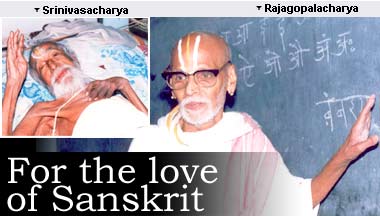
It was 1955 when O R Rajagopalacharya, a Hindi schoolteacher, first fell in love with Sanskrit. He became so besotted with the language that he decided he had to spread the word, to make sure the language he thought so highly of did not die. And so Rajagopalacharya, then 34, decided to give free Sanskrit classes to anyone who cared to learn. There just remained the problem of finding a place to teach interested students.
Help came from N Srinivasacharya, a 51 year-old schoolmaster who offered the use of his Mambalam school. "I am happy that you want to do something for the language," he told the younger man.
Thus, with five students on the rolls, the Mambalam Samskruta Vidyalaya got going.
From day one, Rajagopalacharya established a routine. He would finish with his Hindi classes, rush home for a glass of hot filter coffee, and then walk over to Srinivasacharya's school to wait for his Sanskrit students to turn up.
Though the school is now gearing up for its golden jubilee celebrations, Rajagopalacharya's passion has not waned. He is now 84, and Srinivasacharya, 101. The Samskruta Vidyalaya, which began with just five students, now has as many as 50 students of all ages on its rolls.
Today, the 84 year-old Sanskrit teacher does not have the energy to walk all the way from his house to the school in the evenings. So his son drops him off on a scooter by 6pm. The students come only by 7pm, but he wants to be there before them; he prefers to wait for them.
Srinivasacharya also cannot walk around anymore. Lying on a bed, the centurion recalled the old days. "The vidyalaya [school] was started 50 years ago, but I still remember the day he [Rajagopalacharya] didn't have a place to conduct classes. Love for Sanskrit came naturally to both of us. That's why I gave him the place free and he taught students free. We will die one day, but Sanskrit will never die because it is a devabhasha [language of the gods]. I am happy that I am alive to witness the golden jubilee celebrations."
Amidst the bustle of students in their twenties running around organizing things, the two old men happily discussed their passion for the language.
Rajagopalacharya, whom students call Periya Master, said his inspiration came from the poet Kalidasa. "My motto is to spread the age-old language of India to as many people as possible," he said. "And like Kalidasa, I should do it free."
Rajagopalacharya has stuck by his resolve all through. Even in the early days, he turned down offers of up to Rs 100 a princely sum at the time. "I did not budge," he said. "I used to tell them, come to my vidyalaya, I will teach you free! Accepting money for imparting the knowledge of Sanskrit is against the very old principles of teaching."
Rajagopalacharya still remembers the day a student gave him a veshti, betel leaves, and an arecanut as a gift to the guru. When he went home, he found a hundred-rupee note inside. The very next day he returned not only the money but also the veshti.
The Samskruta Vidyalaya does charge a fee: one rupee for registration. Anyone who has reached at least the sixth standard can join the vidyalaya. "Otherwise, they will not be able to grasp the grammar well," explained Rajagopalacharya, adding that even retired people come to learn Sanskrit from him.
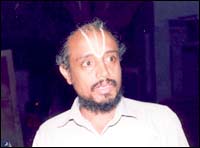 Rajagopalacharya's son O R Devanath, who has a doctorate in Sanskrit and now works as a Sanskrit lecturer at the Presidency College, has taught at the vidyalaya since he was in college. Even during important festivals like Deepavali his father would visit his wife and children at Sreerangam (300km away from Chennai) just for a day and rush back.
Rajagopalacharya's son O R Devanath, who has a doctorate in Sanskrit and now works as a Sanskrit lecturer at the Presidency College, has taught at the vidyalaya since he was in college. Even during important festivals like Deepavali his father would visit his wife and children at Sreerangam (300km away from Chennai) just for a day and rush back.
"He started the school even before I was born," Devanath said. "He very rarely came home because he didn't want to miss teaching Sanskrit even for a day. He was that dedicated."
Although his father's love for Sanskrit took precedence over his duties towards his family, Devanath has no complaints. In fact, he also started loving the language from a very young age.
"It was only because of my father that I am what I am today," he said. "What I have learnt from my father is dedication to one's duty. I am also following the path travelled by this great man. He has been teaching the same basics of Sanskrit for the last 50 years but he is not bored... I find it amazing."
Kshama, Rajagopalacharya's 11 year-old granddaughter, too has been studying at the vidyalaya for a year now.
It was on a Saturday evening that I went to the vidyalaya. At 6.15pm, the Master arrived; all the students gathered by 7pm.
On Saturday a vag vardhini sabha is convened, with all students being expected to make a speech and converse with each other in Sanskrit. Rajagopalacharya started the sabha to encourage his students to speak in Sanskrit without embarrassment.
"We are supposed to speak and converse only in Sanksrit in this sabha," said Devanath. "That has helped me immensely in my career as a lecturer. I have written two plays in Sanskrit and our students have presented them to an audience. That was only because of the training I got here in this vidyalaya."
Sunanda, a Hindi teacher like Rajagopalacharya, had also been interested in learning Sanskrit. "For 20 years, I searched for a master," she said. "Only four months ago, I came to know about Periya Master. I am amazed to see a man like him today, when everything is so materialistic. He is so old; still he wants to teach us, and that too free! Most of the time we would be late, but he would be waiting for us here. That's the greatness of the man."
Sunanda joined the school because she wanted to read the ancient scriptures in the original. She has also decided that, like Rajagopalacharya, she will teach Sanskrit free.
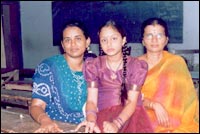 Akhila, an English lecturer at the Stella Maris College, Chennai, also enrolled because she loved the language. "From my childhood I was interested in Sanskrit, but I never got an opportunity to learn it," she said. And then she heard of the vidyalaya.
Akhila, an English lecturer at the Stella Maris College, Chennai, also enrolled because she loved the language. "From my childhood I was interested in Sanskrit, but I never got an opportunity to learn it," she said. And then she heard of the vidyalaya.
"Only after learning Sanskrit did I come to know that there is a treasure house waiting to be explored," Akhila said. "As Indians, we should feel ashamed that we have left our rich classical knowledge in the hands of Westerners. We have allowed them to interpret it the way they like. It is not to learn the Vedas or the Upanishads that I am learning Sanskrit, but to know my culture and my roots."
Akhila has also taken a leaf out of her teacher's life, and begun teaching children Sanksrit free. "What my guru is doing is laudable," she said. "I want to be like him. He has inculcated in us the realization that the language should be propagated only free!"
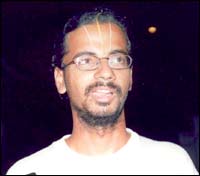 Srinath, a 23 year-old MBA from IIM Calicut, one of the students doing the hard running to ensure that the golden jubilee celebrations go well, has been part of the vidyalaya ever since he was 10. Initially, it was his father who pushed him to the school. But "after four years of studying [Sanskrit], I got attached to the language and the master," Srinath said. "I used to be in his house all the time. Then, during my engineering college days, I used to come only on Saturdays. During my final year, I couldn't come at all. Then, of course, I couldn't come here during the two years at IIM. Now that I am back in Chennai on work, the first thing I did was to come and rejoin here."
Srinath, a 23 year-old MBA from IIM Calicut, one of the students doing the hard running to ensure that the golden jubilee celebrations go well, has been part of the vidyalaya ever since he was 10. Initially, it was his father who pushed him to the school. But "after four years of studying [Sanskrit], I got attached to the language and the master," Srinath said. "I used to be in his house all the time. Then, during my engineering college days, I used to come only on Saturdays. During my final year, I couldn't come at all. Then, of course, I couldn't come here during the two years at IIM. Now that I am back in Chennai on work, the first thing I did was to come and rejoin here."
Srinath too is full of admiration for Rajagopalacharya, and describes with awe the time the master came over from the hospital when his wife was ill. "I don't think I can ever be like him," he said.
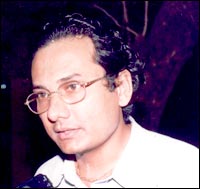 Ajit Kumar, working for his doctorate at the department of management studies at IIT Madras learnt of the vidyalaya four years ago. Till then he had gone through a few correspondence courses in Sanskrit and was pleasantly surprised to hear of the free option.
Ajit Kumar, working for his doctorate at the department of management studies at IIT Madras learnt of the vidyalaya four years ago. Till then he had gone through a few correspondence courses in Sanskrit and was pleasantly surprised to hear of the free option.
"The Vedic tradition is to teach free of cost," he said. "I would have been surprised if he had charged money for it. I feel it loses its sanctity if you commercialise this particular education. People come here with genuine interest to learn, and the father-son combination teaches with genuine interest. Other than the language, I have imbibed his [Rajagopalacharya's] sense of commitment. Despite his old age and weakness, he comes and teaches us. One day, he fell so ill that I had to literally carry him to his house." But still Rajagopalacharya carried on.
Asked whether he has any goal in mind, Rajagopalacharya smiled. "I have no dreams or ambitions," he said. "I love this language, and that is why I am spreading it. That's all. Till I have life in my body, this vidyalaya will continue. Till my last breath, I will continue to come here. Teaching is the only tonic I take."
Photographs: Sreeram Selvaraj | Headline Image: Rahil Shaikh






 © 2025
© 2025